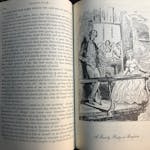In Wendell Steavenson's debut novel, a character with a résumé much like her own works as a reporter for an American newspaper overseas, chronicling numerous angles of the War on Terror. Over the course of 12 years, Kit is stationed in Baghdad, Beirut, Paris and the Greek island of Kos. The book follows the real events that unfolded during this time, beginning with the American occupation of Iraq and ending with the ISIS attack on Paris in November 2015.
This spread of time and place offers rich ground for "Paris Metro," which is ultimately a novel about how ideologies and prejudices grow and change. Through Kit's reportage and personal relationships, she meets scores of people with different views on the subjects of the day, and they're never afraid to say what they think.
Steavenson is at her best when she lets her characters go after one another like they do in a Beirut bar after worldwide protests over a Mohammed cartoon turned violent. Kit sits with a group of men, and their conversation slides from issue to issue. At first, they're trading barbs about the protests themselves.
"People are being manipulated," suggests Ahmed, Kit's husband.
"People are upset," she says.
"Don't be fooled by crowds. Crowds are easy to buy," says Ahmed.
"Don't underestimate people, popular sentiment," says Kit. Then they slide to a discussion of what most harms the Middle East at large. Steveanson's characters cannot talk about anything other than the cataclysms in front of them, even if none of their companions will be swayed by words.
What does sway Kit, despite her wide-ranging knowledge of the Middle East and its conflicts, is isolated experience. "Paris Metro" chronicles a number of flash points in Kit's life: the death of a friend, the end of a marriage, betrayal and more. She is, at different times, vulnerable to naive optimism, shortsighted bigotry and stubbornness. This is where the book is most challenging and worthwhile. When Kit changes her mind, she does so forcefully. Those around her hear it. When she changes her mind in a hateful direction, it can be hard to bear. There is always enough pushback that it never feels as though Steveanson is letting painful assertions go unanswered, but it stings nonetheless.
In many ways, "Paris Metro" is a catalog of the ways the continuing War on Terror affects the lives of those close to it. It gives more space to characters from the affected countries than most books, though even more would have served the book better. Steveanson's firsthand knowledge of what it was like to cover these subjects gives "Paris Metro" necessary authority, and in the novel it is wielded well.
Bradley Babendir is a writer who has written for the New Republic, Pacific Standard, the New Inquiry and other publications.
Paris Metro
By: Wendell Steavenson.
Publisher: W.W. Norton, 371 pages, $25.95.





